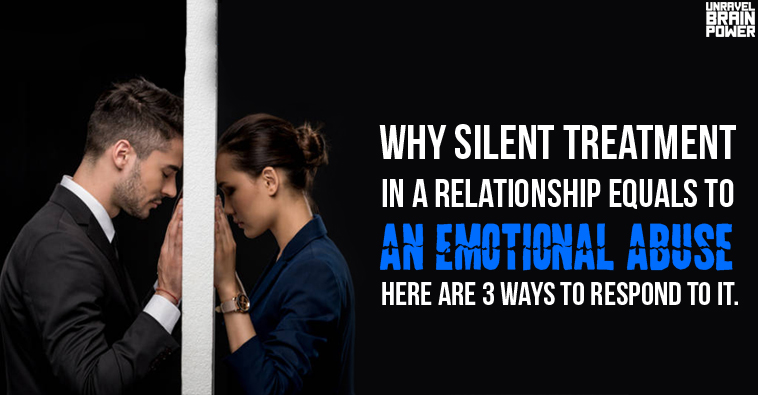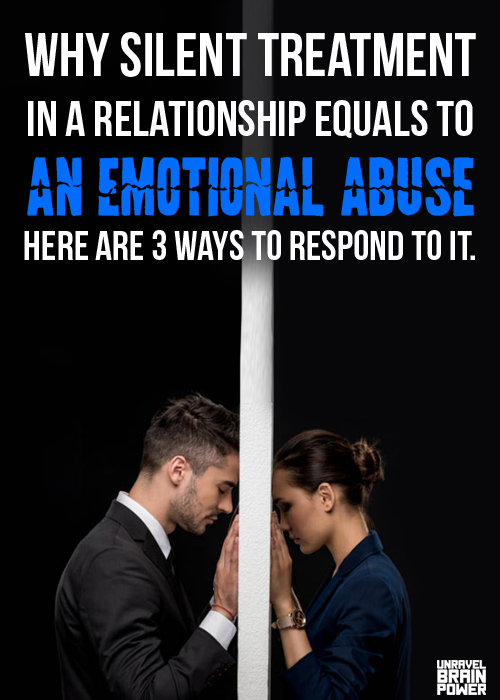
Though it might seem to be a normal conflict in a relationship, but silent treatment is a toxic form of emotional abuse.
Sometimes we really have nothing to say. A disconnect is seen when both the sides go off to their respective psychological corners to reflect and then resume with a mutual desire for clarity.
The silent treatment is the denial to engage in verbal communication with someone; this happens often as a response to conflict in a relationship. It is a passive aggressive form of control and in many circumstances can be considered as a form of emotional abuse.
All of us have been at that point where we simply don’t want to go back to a disagreement, not even out of fear of its aggravation instead all we do is withdraw ourselves in order to punish the other person.
The Silent Treatment is considered the number one passive-aggression weapon, as it makes one’s opponent feel uneasy while providing you a false sense of empowerment.
It demands a sort of mental and emotional perfection from others that, quite honestly, does not exist in anyone.
Ignoring anyone in this way can be extremely miserable. The psychological effects can be long lasting. Frankly speaking it is very unfair too.
The Silent Treatment Screams “You should know!”
When two people feel suffocated and turn mute because of conflict, there comes the point where
‘You should know’:
- What you did wrong?
- How you feel?
- What you need to do to end this silence –is what is expected from both the ends.
Now this, ‘You should know’ is applicable under the assumption that you and the other person are in an absolute sync that “I don’t have to explain why I hurt” feels utterly logical and perfectly reasonable.
“You should know how I feel. You ought to know what you need to do to end this.”
The silent treatment, in such cases, serves to reinforce the unuttered insecurities of the withholder and will eventually spiral (it may take years and multiple occurrences) into the kind of mistrust that ordains a relationship: a self-fulfilling forecast of cold glances and mental allegations.
So this silent treatment is basically a pillow over your loved one’s face while you scream into it.
Misery Loves Company
A part of the silencer wants to make the other suffer for making them withdraw.
If the goal was actually understanding and resolving the issues, silencers would definitely open their mouths. They’d deal with the uncomfortable realization that human emotions are awful and unmanageable at times. When they aren’t dealing with it, they are actually busy wondering of how resilient those awful emotions can be.
All of us need to understand this about life and interpersonal relations: your loved one will be supplied with an abundance of reasons to leave you over the course of your time, both internally and externally. Believe it.
So rather than being silent with them, be vocal with yourself. What’s got you so out of sorts? The silent treatment is almost always a tactic to be avoided while dealing with your own inner demons.
Hence, if you’re on the receiving end of the silent treatment and you want to handle things with dignity, what do you think can be done here?
Apologizing? Kneeling down? That’s absolutely useless. But here, you’re supposed to suffer and you don’t want to suffer. Most importantly, you don’t want your loved one chained with unwanted thoughts of wanting you to suffer.
Reacting to the silent treatment requires a great deal of sensitivity, openness and understanding.
Be honest, because that’s what you’d want from the other person, isn’t it? Say that, “I wish we could figure out what’s going wrong,” because it requires two hands to clap.
Be sincere with it. Do not pretend to be ignorant about the silent treatment; because that will simply ignite the already burning issue.
This becomes really difficult and puzzling for the one who is trying to melt the ice. They feel hurt and guilty at the same time which is indeed a terrible feeling.
You instinctively want to resolve the issues, but the instances are generally based on things about which you are clueless about what you’ve done wrong (in the other’s eyes) at the first place or on some petty matters as the silencer might be feeling the need to gain control over the relationship.
Being on the receiving end of this emotional manipulation is seriously a no-win scenario.
It’s like getting into the confusion of not knowing what you did, the uncertainty of not knowing what to say, the belittling of your own feelings being dismissed, the doubts planted on whether the relationship is workable and an additional guilt over feeling that you’ve created a gap in something precious- making the person feel more vulnerable.
Simplicity – The Key to unlock:
Remember don’t accept the other person’s ploy for power, don’t internalize it either consciously or unconsciously on their part – This in turn becomes a sign that you are failing on your part.
You have to know that nothing you’ve done is wrong. A legitimate grievance is one thing but a sustained sulkiness from another is not a good thing to hold on to.
Love as well as communication is not a game of sides, score-keeping and wins.
Two simple rules are always worth remembering- Be good to each other and be good for each other.
You’ve to acknowledge the reality that no one can read your mind and that you are not, despite how much you feel that you’re emotionally honest or an open book. Nor is either of you excluded from the responsibility of making things work, if there’s anything “there” to work with in the first place.
Reality is a decent place from which to start conversations. Silence? Sometimes all it does is screaming.
To know when it is right to use the Silent treatment:
It’s worth remembering that there is a time and a place for silence. In fact, sometimes, silence is actually recommended.
Silence is perfectly acceptable inn a toxic relationship where one party meets any attempt at conflict resolution with an upsurge of aggression – and does so on a never ending basis.
In this case, remaining quiet is a way to cope up with the situation and the person. Silence is a form of protection and is usually the only way to calm down a situation following an argument.
The silent treatment is also endorsed if someone has escaped an abusive relationship with a narcissist or sociopath. Silence becomes a boundary which prevents a person from being mishandled again.
How to know whether Silence is Brutal?
Here you need to ask yourself: am I defending myself, or am I attacking the other? Exactly that’s where the contrast lies.
Consider if you are staying silent just to gain the control over and make the other person suffer emotionally, then yes that’s abuse.
On the contrary, if you are keeping your mouth shut to avoid the risk of suffering an abuse, then that’s self-defense.
If you’re unsure, ask yourself the following questions:
1. Are you quiet again, but want them to make the first move now?
When disagreements occur, it can take a little time for those aroused feelings to calm down.
Silence during this phase is not bad as it can actually prevent you from saying or doing things you would later regret.
But if you are keeping quiet even after you have calmed down because you wish that they must make the first move for reconciliation, that’s a bit abusive.
The best thing to do is to be ready to talk things out. That really helps.
2. Will only a full apology do?
Ask yourself whether you would stick to the silence for as long as the significant other does not offer a satisfactory apology?
Perhaps they might have shown remorse and tried to rectify themselves, but it wasn’t quite up to the mark (like the one you thought it would be).
One needs to really move from their position a little and join hands with the other person in breaking the ice in between. This doesn’t mean that one has to forgive, but at least participating in a conversation about what happened and why it made the person feel so hurt, can definitely help to calm down the situation.
3. Do you take responsibility for the disagreement?
Yes at times the other person is absolutely wrong. Some things are inexcusable.
But this is not the case every time.
If you are maintaining silence despite some fault from your end, you are actually ignoring the role you played in the argument that led to the present scenario.
This is cruel because the other person becomes a culprit in turn making them feel bad about it.
4. Will you maintain silence for a specific length of time?
When someone does something that annoys you, do you think, “Okay, I won’t be speaking to them for the rest of the day”? Or the rest of the week, even?
It’s like effectively dishing out a sentence for a crime, regardless of how you might feel at any given time in the future.
It leaves no room for forgiveness or the softening of feelings between you and the other person.
Thus, we must learn to use silence effectively in our lives.
It is a fact that silence does not always help in drifting away the problems in any relationship, so it is more preferable to open up and clear out the misunderstandings. We need to learn the art of forgiving also.
Peaceful coexistence is all we seek throughout our lives, isn’t it? Think over this and try to achieve it.






